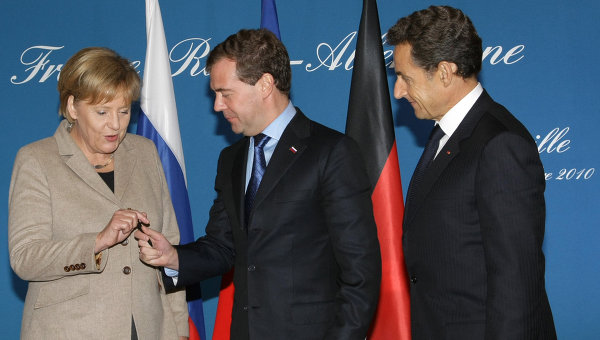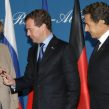
Meseberg Process: Germany Testing EU-Russia Security Cooperation Potential
Publication: Eurasia Daily Monitor Volume: 7 Issue: 191
By:

The Franco-German-Russian summit in Deauville and its timing (Medvedev Deflects Merkel-Sarkozy Proposal on Transnistria at Deauville Summit, EDM October 22) reflects the fragmentation of Euro-Atlantic and EU policy-making vis-à-vis Russia. This process was ongoing for some time and accelerated recently. The financial-economic crisis has stimulated a competitive race for business deals with Russia, distorting policies at the national levels as well as NATO and EU levels. Major European states seem ready to underwrite Russia’s “modernization,” without an accompanying analysis of such modernization’s possible effects on the future balance of power in Europe. The Obama administration’s “reset” of its Russia policy has encouraged imitations in Europe and bilateralizing relations with Russia, particularly by larger European states, at the expense of allied policies. NATO had even earlier forfeited the role of security actor in Europe’s eastern neighborhood. Erosion of confidence in US policies, and perceived US disengagement from European security affairs, inspire proposals for direct arrangements with Russia, sidelining the US and NATO (“The Specter of a Multipolar Europe,” European Council on Foreign Relations, October 2010).
Germany is pursuing its special path (farther along than runner-up France) toward deeper bilateral relations with Russia. The German government can gain added weight for its own Russia policy by embedding it to some extent in a European framework. As part of this policy, Berlin seeks ways gradually to accommodate Russia into decision-making processes of the European Union and NATO. This German policy pre-dates the current malaise in the West, but has gained more leeway for action in the current atmosphere. Germany is moving incrementally from special relations to strategic cooperation and sector linked economic integration with Russia. Outrunning EU-Russia relations, Germany seems positioned to initiate security arrangements of the EU with Russia, separately from the United States and NATO, and potentially reducing the relevance of both.
The German government has identified the conflict in Moldova’s Transnistria region as the issue most likely to demonstrate that the EU can work one-on-one with Russia on European security. Moscow is exploring this strategic opportunity. The document proposed by Chancellor Angela Merkel, and finalized by her with President Dmitry Medvedev during their meeting at Meseberg Castle near Berlin on June 4-5 (Meseberg Memorandum) is the seminal document for this process (www.bundesregierung.de, June 5).
The document proposes creating an EU-Russia Political and Security Policy Committee, to be chaired by the EU’s High Representative for Foreign Policy Catherine Ashton and Russia’s Foreign Affairs Minister Sergei Lavrov, for high-level consultations and decisions. The committee’s mandate would include “setting ground rules for joint civilian and military crisis management operations by the EU and NATO,” as well as “working out recommendations on various conflicts and crisis situations, to the resolution of which the European Union and Russia may contribute within appropriate multilateral forums.”
On these definitions, the EU-Russia Committee would be vested with greater powers than those of the NATO-Russia Council. It would also institute an EU-Russia policy coordination mechanism, such as the EU does not have with the United States or with NATO (despite the overlap in EU-NATO membership). Thus defined, the committee can open access for Russia to the EU’s own decision-making process (without any influence from the EU on Russia’s decisions). It could also inspire Russian demands for access to NATO decisions through the NATO-Russia Council.
To test the potential for EU-Russia security cooperation, the memorandum proposes joint EU-Russia steps “aiming for tangible progress toward a solution of the Transnistria conflict within the existing 5+2 format. The joint [EU-Russia] work could involve a common EU-Russia engagement to achieve a seamless transition from the present circumstances to a definitive situation.” This exceedingly vague goal-formulation looks like a Russian input into the joint Memorandum’s drafting.
The memorandum envisages “taking stock of the progress achieved in the framework of the new committee at the next EU-Russia summit” (December 2010). This reflects haste, potentially de-coupling the committee’s creation from any progress that could conceivably be achieved on Transnistria from June to December 2010.
The German side duly consulted with Moldova ahead of the Meseberg meeting with Medvedev. Chancellor Merkel received Moldovan Prime Minister, Vlad Filat, in May in Berlin, subsequently consulting also with France and Poland within the Weimar Triangle format, as well as with Romania (most recently during Merkel’s early October visit with President, Traian Basescu, in Bucharest). However, Berlin is not known to have consulted with Washington (which participates in the 5+2 format on the same basis as the EU). The French government consulted with the Moldovan ambassador in Paris ahead of the Deauville meeting (Radio Free Europe, October 18).
Whether the EU itself supports Berlin’s initiative, however, remains far from clear in the run-up to the December summit. All indications seem to be that there is no official decision by the EU thus far.
In Berlin’s view, Russia should ultimately withdraw its troops from Moldova’s territory and allow Moldova to reunify with Transnistria (subject to myriad details on political, constitutional, and military issues). In return for cooperating to settle this conflict, Russia could receive a major role in European security affairs, with access to EU decision-making processes via the proposed committee.
The German initiative can generate a positive dynamic in the negotiations on Transnistria. It can also help raise this conflict high on the EU-Russia agenda. The Russian side (Moscow and Tiraspol) had aborted the 5+2 negotiations in March 2006, never allowing them to resume. Berlin’s proposal can incentivize Moscow to lift the logjam at least on the negotiating process, if not necessarily on an outcome consistent with European interests.
However, the German initiative seems to offer Russia a ticket to decision-making on European security, in return for cooperating on Transnistria, and before actually delivering results there or in other conflicts. This ticket is a cheap one for Russia to enter the EU’s decision-making sanctuary.




